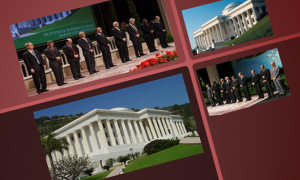To predict the leadership system after himself, the second leader of Baha’ism, the Excellency Abdul Baha had appointed two pillars: The guardian position and the foundation of the universal house of justice. In order to make these two positions clear, the council of the universal house of justice has been considered to be infallible by God and the guardian position has been appointed as the supervisor of the council:
“اما بیت العدل الذی جعله الله مصدر کل خیر و مصوناً من کل خطأ”
“However, the universal house of justice which has been appointed by God as a source of each benevolence and is infallible.” It should be formed by the public elections; that is the faithful souls… Additionally, the guardian of God’s faith is the chairman of this assembly and the greatest member.[1]”
Meantime, the foundation of the leadership of the universal house of justice which became the only system of the leadership of Baha’ism after Shoqi Effendi got abortive. On the other side, all of his power and responsibilities was confiscated in favor of himself. Because Abdul Baha had assigned confronting those members of the universal house of justice who commit sins to them: “if a member commits a sin to make harm for the public, the guardian of the faith is merited to expel him. Then, the nation will elect another person.[2]”
However, the members of the so-called new council of the universal house of justice (confessed by Abdul Baha to be the copy of the western parliament: “The greatest divine universal house of justice must be elected based on the arrangement and the system of election in European parliaments.[3]”) who are considered as infallible have formed a dictatorial system in leading the Baha’is. The evidence of this claim is that the reason for changing the members of the universal house of justice is the people’s death and old ages.[4]
Thus, Francesco Ficicchia[5] states explaining the structure of the universal organization of Baha’ism: The teachings and beliefs of Baha’ism is merely accepting and executing the orders of the organization. Because the structure of the organization is based on obeying and emphasizing the obedience blindly. A person who violates the main rule will be boycotted.[6]
Ficicchia has considered the political aims of the universal organization of Baha’ism as dictatorial, anti-people and strongly opposed to freedom. He believes that the radical political beliefs of the leadership of the Baha’ism universal organization are originated from fascist tendencies. According to him; in the Baha’ism organization the members are encountered with boycott against critical thought, individual innovations, freedom of speech, criticism for strict regulations, censorship and studying the opponents’ works.
[۱] Assadullah Fadhel Mazandarani, Amr & Khalq epistle, the electronic copy, Vol. 4, pp. 304-305.
[۲] Abbas Effendi, will tablets, Pakistan: The national spiritual assembly of the Baha’is, 1960 A.D., p. 16.
[۳] Asadullah Fadhel Mazandarani, Amr & Khalq epistle, the Western Germany: the national spiritual assembly, 141 Badi’a, Vol. 4, p. 297.
[۴] As 25 members of this foundation have 431 years of membership; while 8 Iranian people have 135 years of record.
[۵] The German author who was born in 1971 A.D. who became the member of the Baha’i assembly and was boycotted in 1974 A.D. due to criticizing the Baha’ism organization beliefs.
[۶] Abbas Effendi, the will tablets, Pakistan: The Baha’i national spiritual assembly, 1960 A.D. p. 13






